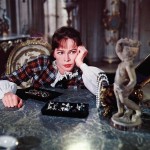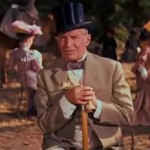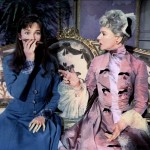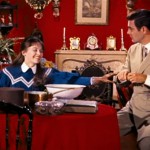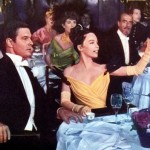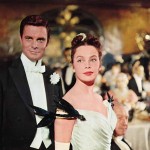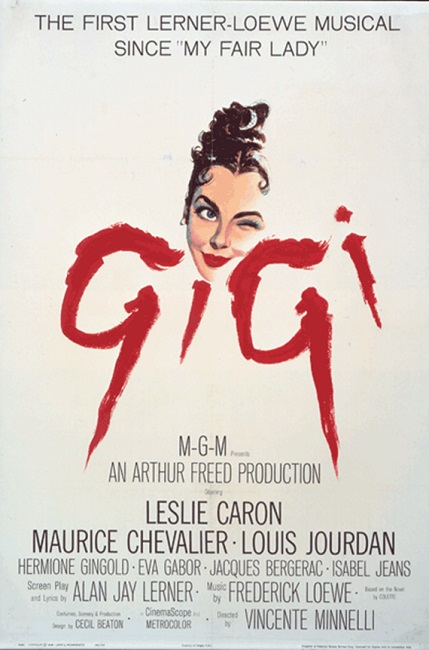
Gigi – 1958
Gigi seems to be a bright and colorful precursor to the decade of the musical. This is the Best Picture winner for 1958 and there seem to be a number of them coming up in the next decade. Up until now the only musicals to have won Best Picture are Broadway Melody of 1929 and An American in Paris. (Going My Way was really a movie that had music in it.) Then West Side Story, My Fair Lady, The Sound of Music, and Oliver all won their Oscars in the 1960s. After that, the next and only musical to take home the Best Picture Award is Chicago in 2002.
I’ll be honest. I was not terribly impressed with Gigi. I felt like it was trying too hard to be something it wasn’t. The music was written by the wonderful team of Alan Jay Lerner and Fredrick Loewe. They wrote such other great shows as Brigadoon, My Fair Lady, Camelot, and Paint Your Wagon. You see, even though Gigi was written after My Fair Lady, the movie was made first. My Fair Lady had been a very successful Broadway show before being made into a movie, but Gigi was a film first, and a stage show second.
Gigi had several things most musicals from that era had. It had a few catchy tunes, characters who were insanely wealthy, beautiful costumes, and elaborate sets. But there was, in my humble opinion, an underlying dullness to the plot that caused the movie to fall flat. The story was predictable and slow, and there didn’t seem to be much of a climax. The characters were shallow and pretty one-dimensional. And at times, there was a creepiness that made me slightly uncomfortable… but we’ll get to that in a minute.
Leslie Caron, whom you might remember as the female lead in An American in Paris, plays the title role of Gigi, a young girl in Paris being raised by her grandmother, played very well by Hermione Gingold. Gigi is innocent and childish, almost tom-boyish. A friend of the family is the rich young playboy, Gaston, played by Louis Jourdan. Hmmm… I wonder if they will end up together in the end. Yes, of course they will, so maybe the plot is about the obstacles they have to overcome. Nope, no real obstacles. Maybe another man or another woman might enter the picture to pull them apart. No, no other serious prospects.
As far as I can tell, the only believable conflict in the relationship is that Gaston loves Gigi because of her innocent vivaciousness and her tom-boyish personality. Her grandmother and her great-aunt, played by Isabel Jeans think that in order for Gaston (or any man with money, for that matter) to want Gigi, she needs to be a proper lady who knows how to behave in high society. Their solution is to train her and change her into the woman they think Gaston wants. But when Gaston sees this change, sees that the machinations of Gigi’s tutors have actually caused Gigi to grow up, he explodes in a fit of fury and rejects her. But don’t worry, his anger inexplicably vanishes in seconds and he loves her too much to let her go. Hooray for the happy ending.
And therein lay the creepy aspect that I mentioned earlier. He only seems to like her when he sees her as a child. This questionable sentiment is epitomized by the character of Honore Lachaille, played by Maurice Chevalier. Normally, I like Chevalier. He has a manner that is utterly charming and delightful. But in this film, the word pedophile kept touching my thoughts whenever he was on the screen. He plays the part of Gaston’s older (almost elderly) uncle who is coaching his nephew in the ways of being a rich Parisian playboy. Right from the very beginning of the movie, Honore is singing about how much he loves little girls because they have a tendency to grow up into beautiful young women. Creepy!! He spends the entire movie chasing after and carousing with women who are less than half his age. Creepy!!
Next we come to the music. With one or two exceptions, the music was unmemorable. One thing that Lerner and Loewe do that might lend to this is the speaking song. When most people see a musical they want a catchy tune, something they can hum along with. But when a song has no discernible melody, there is no tune to hum. To emphasize that Gaston in one of his fits of anger, he speaks his way through his song in a voice of extreme irritation. The lyrics rhyme and the orchestra is playing in the background, but the song has no real melody. They did the same kind of songwriting for the stuffy British bachelor in My Fair Lady.
And I have to mention the choreography. Some of it seemed awkward, and at times, even silly. When Gigi is singing about what it is like to be a young girl in Paris (The Parisians) some of her movements seemed tailor made to drive home the point. This had the effect of making the choreography look forced. Come on, people – Caron was a dancer. They should have let her dance.
Now, all that being said, there were a few things about the movie that I enjoyed. They really spared no expense on the costumes and sets. They were lush and gorgeous, again, making great use of bright colors whenever possible. I especially liked how they made a distinction between the generations for the women’s fashions. The older women wore beautiful dresses that seemed old-fashioned, even for 1900. The younger women wore gowns that seemed like couture for the 1910s, even moving towards a 1920s sensibility.
As far as the acting went, Hermione Gingold stood out as a pleasure to watch. I remember seeing her in The Music Man, and hearing her distinct voice on the soundtrack of A Little Night Music. She turned in another delightful performance in Gigi. There were a few songs that also stood out as memorable. The Night They Invented Champagne and I Remember it Well were wonderful songs. Chevalier and Gingold only shared a brief moment together, but their on-screen chemistry was delightful to see.
This was not one of my favorites when it comes to the Best Picture winners. It was too much fluff and foo-foo, and not enough substance. I had the plot figured out before five minutes had passed. And it all happened too slowly for my tastes. The gem had a few sparkles, but for the most part, it was a pretty dull diamond.
